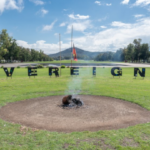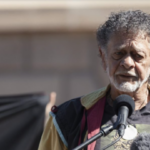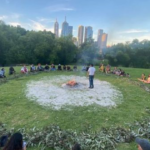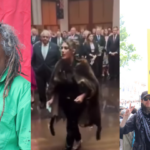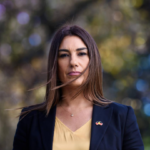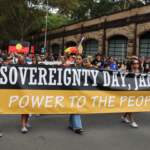The Burning Question of Sovereignty: Interview with IAPA Candidate Uncle Wayne Wharton
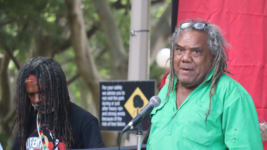
Uncle Wayne “Coco” Wharton is running for the Queensland Senate in the 7 May federal election for the Indigenous Aboriginal Party of Australia (IAPA), and the Kooma elder, along with his fellow IAPA candidates, are seeking to advance improved waterways, end First Nations child removes and child imprisonment, address housing needs and see traditional resource management progressed.
Wharton also has First Nations sovereignty front and centre of his parliamentary pitch, as he asserts that Australian parliament has for too long, in fact since its inception, failed to address or even admit First Peoples sovereignty over this continent prior to British invasion, and even after the 1992 Mabo decision deemed the colonial claim of terra nullius a fiction, government has continued to deny this.
The 2022 federal election was unique in terms of a number of outcomes. The Australian legislature has had a broader representation of First People than ever before: 11 Indigenous members accounting for almost 5 percent of all members. The other notable change was a significant slide away from voting for the major parties, as many instead voted for minor parties and independents.
The addition of Independent Senator Lidia Thorpe to parliament, over its last term, has resulted in certain Indigenous issues being raised in a more formidable manner than ever before. And with the potential for other nonmajor party aligned First Nations voices in parliament, such as Wharton, it seems that federal parliament may further be addressing the most pressing issues on this continent.
Pushback indicates progress
One of the most prominent moves by the Albanese government over its last term of office was to hold a referendum on whether to establish an Indigenous voice to parliament that would be enshrined in the constitution. Many prominent First Nations commentators, however, rejected the Voice as a watering down of treaty demands and a backdoor approach to constitutional recognition.
The No campaign forged by the Coalition opposition saw the Voice referendum voted down by 66 percent of Australians. And as Liberal leader Peter Dutton and other voices leading the No campaign put it to the general public that they should oppose the Voice as it would represent all too powerful input of First Peoples voices into national affairs, this overall rejection revealed deep-seated racism.
Yet, regardless of this conservative pushback, which is occurring globally in the west at present, the heated opposition to Aboriginal advancement that has raised its ugly head can be understood as a backlash against the recent campaigning of First Nations people that has been successfully eroding distorted versions of history and revealing the oppressive policies of successive governments.
Sydney Criminal Lawyers spoke to Indigenous Aboriginal Party of Australia candidate for the Queensland Senate Wayne “Coco” Warton about progressing the issue of sovereignty in federal parliament, the ongoing unaddressed issue of occupation on this continent, and other prominent issues, like housing, that he plans to progress on being elected into office.
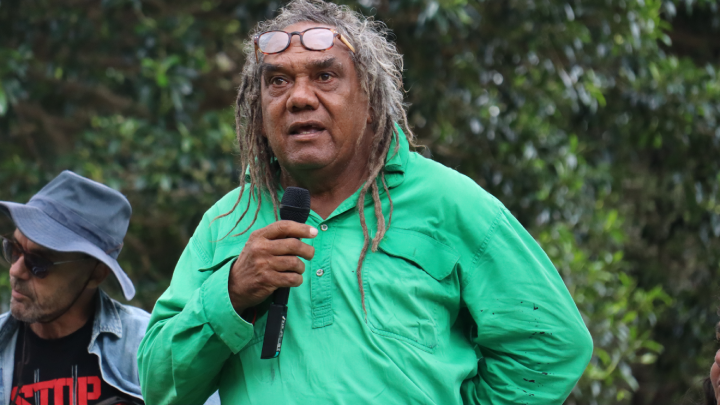
Uncle Coco, you’re running on the Indigenous Aboriginal Party of Australia ticket for the Queensland Senate in the May federal election.
Indigenous issues have been prominent over the last term of parliament, especially in terms of the unsuccessful Voice referendum.
So, at the end of this term of the Albanese government, how do you consider the state of Indigenous affairs in this country?
There is still a long way to go. The question of occupation in this country is still one that has not been addressed – not properly since the Mabo decision.
What should have happened with the Mabo decision is that everything that was founded on terra nullius should have been corrected.
So, there is a lot of work that needs to be done that hasn’t been done over the last 30 years. The willingness to address that question by the 23 million people who have come here needs to be looked at.
What hinders all this is the fact that we are stuck in a limbo, where you either vote for the Liberals or Labor as neither party want to address the real issues, as they’re more concerned with staying in power than making hard decisions.
The situation for Aboriginal people is that unless we educate and unless we fight, we will never achieve our liberation or freedom, or anything that looks like restitution.
If you’re elected to parliament on behalf of the Indigenous Aboriginal Party of Australia, what do you plan to achieve in terms of issues that are affecting your people?
Mostly, the abolition of “the gap”. This gap that was created because of our exemption from playing a role in the economic development of the country, and the genocidal practice of putting our people into poverty.
It is ending the welfare industry and trying to instead proceed restitution programs, where our people are able to achieve some sort of economic independence and be able to abolish the poverty gap that we are in.
But also, our people want to pursue truth-telling and make sure that truth-telling and the taking of that direction unites the country and puts us in a position where the nation is able to move on.
That is rather than being deliberately distracted and constantly deferring any answer being put into the place, with real programs that would allow the country to come together.
This is a 301 state solution. This is not a one state solution.
Senator Lidia Thorpe is currently asking the federal government to intervene in the crackdowns on youth crime right across the country at present.
In Queensland, the new Crisafulli government has rolled out some of the most draconian criminal laws against children across the continent, and it admits these will disproportionately affect First Nations children.
What are your thoughts on this criminal crackdown on kids? What do you recommend is done?
It gets back to the force concept, where the colonial forces would like the state government to think that the only way they can control the situation is by force – forced behaviour and in terms of forced behaviour modification.
People around the world have realised that force as a tool to modify people’s behaviour doesn’t work. But here we see the Crisafulli government doing this just to appease the masses, while the Labor government prior to him, allocated several hundred millions of dollars for prisons for young people.
If you look at $700 million to build and maintain two prisons, this is a terrible waste of public resources in 2025.
They are talking about behaviour modification, when that sort of money could have allowed 17 communities across Queensland to run programs, which could have saved $600 million and had better results.
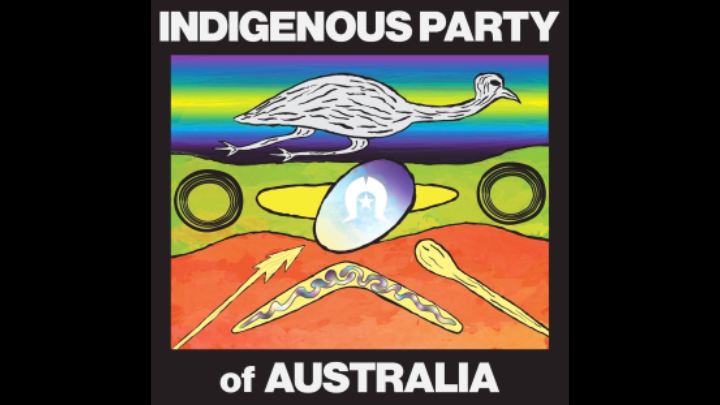
In running on behalf of the IAPA you’ve identified three issues that you want to progress as a politician: sovereignty, truth and justice.
So, can you elaborate on what progressing those issues will look like in federal parliament?
Sovereignty is something that is already sitting there. It has been used as a political football.
Sovereignty was recognised in the Mabo decision, so you have potentially 300 states in Australia that hold sovereignty.
Commonwealth, states and local government authorities have failed to address and identify those Indigenous states.
We’ve seen very little on this issue. We have seen a lot of distractions under reconciliation.
We have seen a lot of distractions about the so-called advisory voice, and we have seen a lot of distraction with the welfare industry, but nothing towards dealing with the 300 states as sovereigns. Nothing.
This was a tactic by the Howard government. It was a tactic by the four Labor governments that have come after it.
But this is something that the public are owed: the general public are owed a federal government that leads state and local governments on how to deal with the coexistence of 300 sovereigns and the Commonwealth.
This is going to take a bit of work. It is happening all the time. We saw the decision in Gove the other day, and we have seen the Timber Creek decision.
People have got to remember that we didn’t bring this law system here. This law system was imposed on Aboriginal people, and we have to make sure that for the benefit of both non-Aboriginal people and Aboriginal people, that the law is followed through and adhered to.
In terms of dealing with First Nations people, it has to come back to the law.
So, you see things shifting in this direction already?
Well, we saw the Gove decision last week. But I have a lot of fear with people like Crisafulli, who think they’re above the law and have the authority to act outside of the law, in terms of the United Nations.
I’m fearful about the message it’s sending to a lot of people.
Lastly, Uncle Coco, if elected into the Senate in May, what are some of the other issues that you want to see tackled at the federal level? What are some of the broader changes you would like to address as a federal politician?
Housing is the major issue. There is the drug epidemic with ice. I want to see that dealt with at the community level across the country, so that it is dealt with as a health issue, rather than a criminal issue.
We know that a lot of Aboriginal people and non-Aboriginal people can’t afford the $1,500 a night in the rehabs.
I also want to see greater access for our people at the university level and making sure that the superannuation and the pensions of people across the board are not threatened.
We don’t want to see the most vulnerable people in aged care, emergency care or mental health care receiving inadequate care, because we know this has gotten out of hand.
The other issue is we have funding of $360 billion for AUKUS, and I want to see that used for other issues where it should be.


